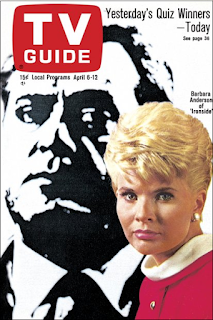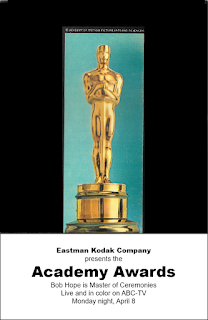This week in TV Guide: April 6, 1968
Some of this week's issue might seem familiar to you from a few years ago, but trust me: I've doubled the content since then, with all-new material!
 Martin Luther King, Jr. was assassinated on April 4, 1968, the start of an awful summer in the United States. All three networks preempted regular programming to cover the story, including King's funeral April 9 in Atlanta. This doesn't show up in this week's issue, which was already on the newsstands when King died, but the impact was felt nonetheless—especially, and most surprisingly, with the biggest program of the week: the Academy Awards.
Martin Luther King, Jr. was assassinated on April 4, 1968, the start of an awful summer in the United States. All three networks preempted regular programming to cover the story, including King's funeral April 9 in Atlanta. This doesn't show up in this week's issue, which was already on the newsstands when King died, but the impact was felt nonetheless—especially, and most surprisingly, with the biggest program of the week: the Academy Awards.
The Oscarcast was scheduled in its then-customary Monday night slot, which fell on April 8, and the show was in tune with the times; of the five movies nominated for Best Picture, two of them—In the Heat of the Night and Guess Who’s Coming to Dinner—dealt with race issues, and several black entertainers would be performing. King’s murder, however, and the funeral scheduled for the day following the Oscars, cast a heavy cloud over the proceedings. On a somber episode of The Tonight Show the day after the assassination (which included Johnny Carson paying tribute to King in place of his opening monologue), Sammy Davis, Jr., who was scheduled to sing one of the Best Song nominees, said he wouldn’t be there. "I certainly think any black man should not appear," he told Carson. "I find it morally incongruous to sing 'Talk to the Animals' while the man who could make a better world for my children is lying in state." He wasn’t the only one; Sidney Poitier, Diahann Carroll, Louis Armstrong, Harry Belafonte, Marlon Brando and Rod Steiger were among those who announced that they, too, would pass up the show if the date wasn’t moved.
Realizing the Academy was in an untenable position, Academy President Gregory Peck called an emergency meeting of the Board of Governors on Saturday, April 6, after which he announced that the show would indeed be moved to Wednesday, April 10, the day after the funeral; in addition, the Governors Ball that followed the ceremony was cancelled, and host Bob Hope’s monologue would be altered. (Hope himself ended the broadcast with a rare moment of seriousness. "Films reflect the human condition," he said. "The moguls shared something with the man in Atlanta—they had a dream.")
 ABC, which was consulted by the Academy on the delay, worked to fill the suddenly-available time on Monday. Along with the other networks, it covered the civil rights march in Memphis on Monday afternoon; that evening, following the regularly-scheduled Cowboy in Africa at 7:30 p.m. ET, came the movie that had originally been scheduled for Wednesday, Move Over, Darling, followed by a special on King at 10:30 p.m. After the late local news, the network wrapped things up at 11:30 p.m. with a repeat of the Joey Bishop Show memorial to King that had first been shown on the night of King’s murder. Those aren’t the only programming changes;
according to Variety
, the Smothers Brothers show scheduled for Sunday substituted a rerun, and CBS also changed Tuesday night’s planned episode of The Red Skelton Hour, replacing a show that featured Nipsey Russell.
ABC, which was consulted by the Academy on the delay, worked to fill the suddenly-available time on Monday. Along with the other networks, it covered the civil rights march in Memphis on Monday afternoon; that evening, following the regularly-scheduled Cowboy in Africa at 7:30 p.m. ET, came the movie that had originally been scheduled for Wednesday, Move Over, Darling, followed by a special on King at 10:30 p.m. After the late local news, the network wrapped things up at 11:30 p.m. with a repeat of the Joey Bishop Show memorial to King that had first been shown on the night of King’s murder. Those aren’t the only programming changes;
according to Variety
, the Smothers Brothers show scheduled for Sunday substituted a rerun, and CBS also changed Tuesday night’s planned episode of The Red Skelton Hour, replacing a show that featured Nipsey Russell.
Only once since has the Academy Awards broadcast been postponed—in 1981, when President Ronald Reagan was shot on the afternoon of the scheduled broadcast. While the NCAA chose to continue with that night’s national championship basketball game (a decision made, in fairness, after it had been announced that Reagan was out of the woods), the Academy voted to move their show until the following night.
Along with the assassination of Robert F. Kennedy two months later, the murder of Martin Luther King triggered a backlash against television violence that manifested itself in rescheduled and re-edited programs. Judging by looking at today's fare, it was a movement that didn't last.
 Martin Luther King, Jr. was assassinated on April 4, 1968, the start of an awful summer in the United States. All three networks preempted regular programming to cover the story, including King's funeral April 9 in Atlanta. This doesn't show up in this week's issue, which was already on the newsstands when King died, but the impact was felt nonetheless—especially, and most surprisingly, with the biggest program of the week: the Academy Awards.
Martin Luther King, Jr. was assassinated on April 4, 1968, the start of an awful summer in the United States. All three networks preempted regular programming to cover the story, including King's funeral April 9 in Atlanta. This doesn't show up in this week's issue, which was already on the newsstands when King died, but the impact was felt nonetheless—especially, and most surprisingly, with the biggest program of the week: the Academy Awards.The Oscarcast was scheduled in its then-customary Monday night slot, which fell on April 8, and the show was in tune with the times; of the five movies nominated for Best Picture, two of them—In the Heat of the Night and Guess Who’s Coming to Dinner—dealt with race issues, and several black entertainers would be performing. King’s murder, however, and the funeral scheduled for the day following the Oscars, cast a heavy cloud over the proceedings. On a somber episode of The Tonight Show the day after the assassination (which included Johnny Carson paying tribute to King in place of his opening monologue), Sammy Davis, Jr., who was scheduled to sing one of the Best Song nominees, said he wouldn’t be there. "I certainly think any black man should not appear," he told Carson. "I find it morally incongruous to sing 'Talk to the Animals' while the man who could make a better world for my children is lying in state." He wasn’t the only one; Sidney Poitier, Diahann Carroll, Louis Armstrong, Harry Belafonte, Marlon Brando and Rod Steiger were among those who announced that they, too, would pass up the show if the date wasn’t moved.
Realizing the Academy was in an untenable position, Academy President Gregory Peck called an emergency meeting of the Board of Governors on Saturday, April 6, after which he announced that the show would indeed be moved to Wednesday, April 10, the day after the funeral; in addition, the Governors Ball that followed the ceremony was cancelled, and host Bob Hope’s monologue would be altered. (Hope himself ended the broadcast with a rare moment of seriousness. "Films reflect the human condition," he said. "The moguls shared something with the man in Atlanta—they had a dream.")
 ABC, which was consulted by the Academy on the delay, worked to fill the suddenly-available time on Monday. Along with the other networks, it covered the civil rights march in Memphis on Monday afternoon; that evening, following the regularly-scheduled Cowboy in Africa at 7:30 p.m. ET, came the movie that had originally been scheduled for Wednesday, Move Over, Darling, followed by a special on King at 10:30 p.m. After the late local news, the network wrapped things up at 11:30 p.m. with a repeat of the Joey Bishop Show memorial to King that had first been shown on the night of King’s murder. Those aren’t the only programming changes;
according to Variety
, the Smothers Brothers show scheduled for Sunday substituted a rerun, and CBS also changed Tuesday night’s planned episode of The Red Skelton Hour, replacing a show that featured Nipsey Russell.
ABC, which was consulted by the Academy on the delay, worked to fill the suddenly-available time on Monday. Along with the other networks, it covered the civil rights march in Memphis on Monday afternoon; that evening, following the regularly-scheduled Cowboy in Africa at 7:30 p.m. ET, came the movie that had originally been scheduled for Wednesday, Move Over, Darling, followed by a special on King at 10:30 p.m. After the late local news, the network wrapped things up at 11:30 p.m. with a repeat of the Joey Bishop Show memorial to King that had first been shown on the night of King’s murder. Those aren’t the only programming changes;
according to Variety
, the Smothers Brothers show scheduled for Sunday substituted a rerun, and CBS also changed Tuesday night’s planned episode of The Red Skelton Hour, replacing a show that featured Nipsey Russell.Only once since has the Academy Awards broadcast been postponed—in 1981, when President Ronald Reagan was shot on the afternoon of the scheduled broadcast. While the NCAA chose to continue with that night’s national championship basketball game (a decision made, in fairness, after it had been announced that Reagan was out of the woods), the Academy voted to move their show until the following night.
Along with the assassination of Robert F. Kennedy two months later, the murder of Martin Luther King triggered a backlash against television violence that manifested itself in rescheduled and re-edited programs. Judging by looking at today's fare, it was a movement that didn't last.
Published on April 06, 2019 05:00
No comments have been added yet.
It's About TV!
Insightful commentary on how classic TV shows mirrored and influenced American society, tracing the impact of iconic series on national identity, cultural change, and the challenges we face today.
- Mitchell Hadley's profile
- 5 followers



